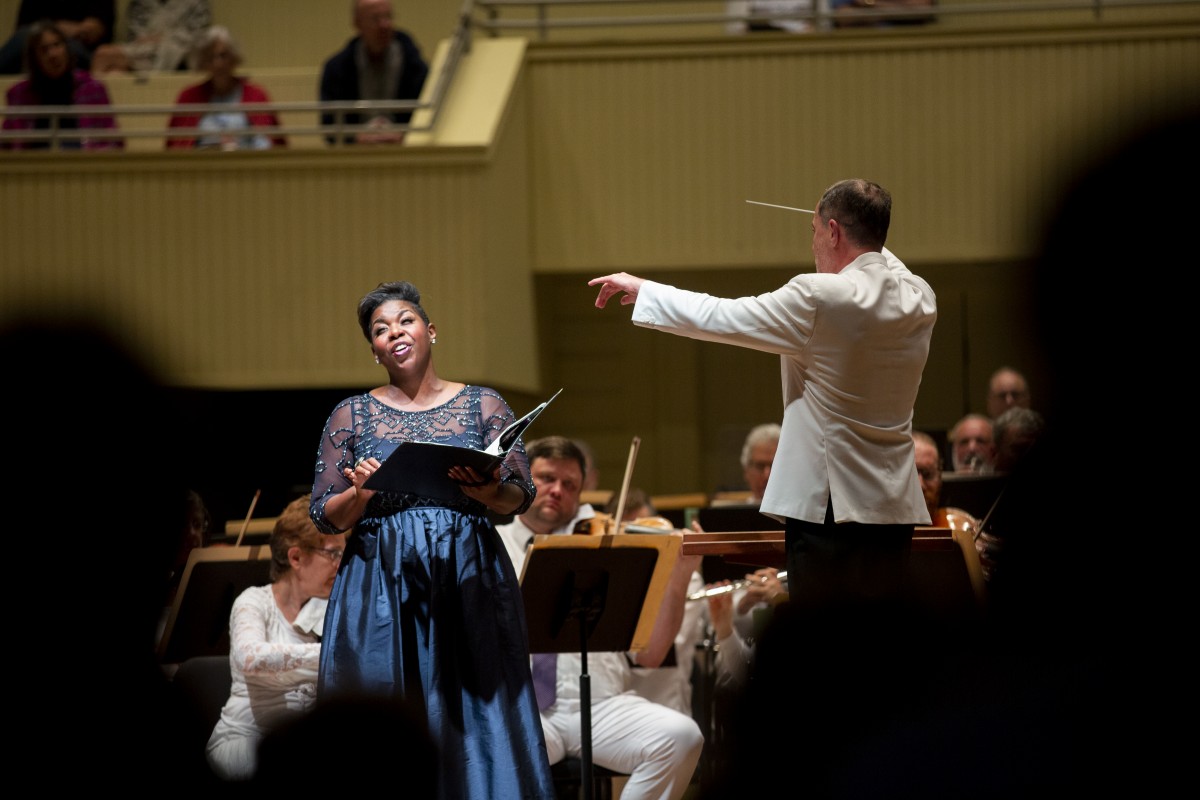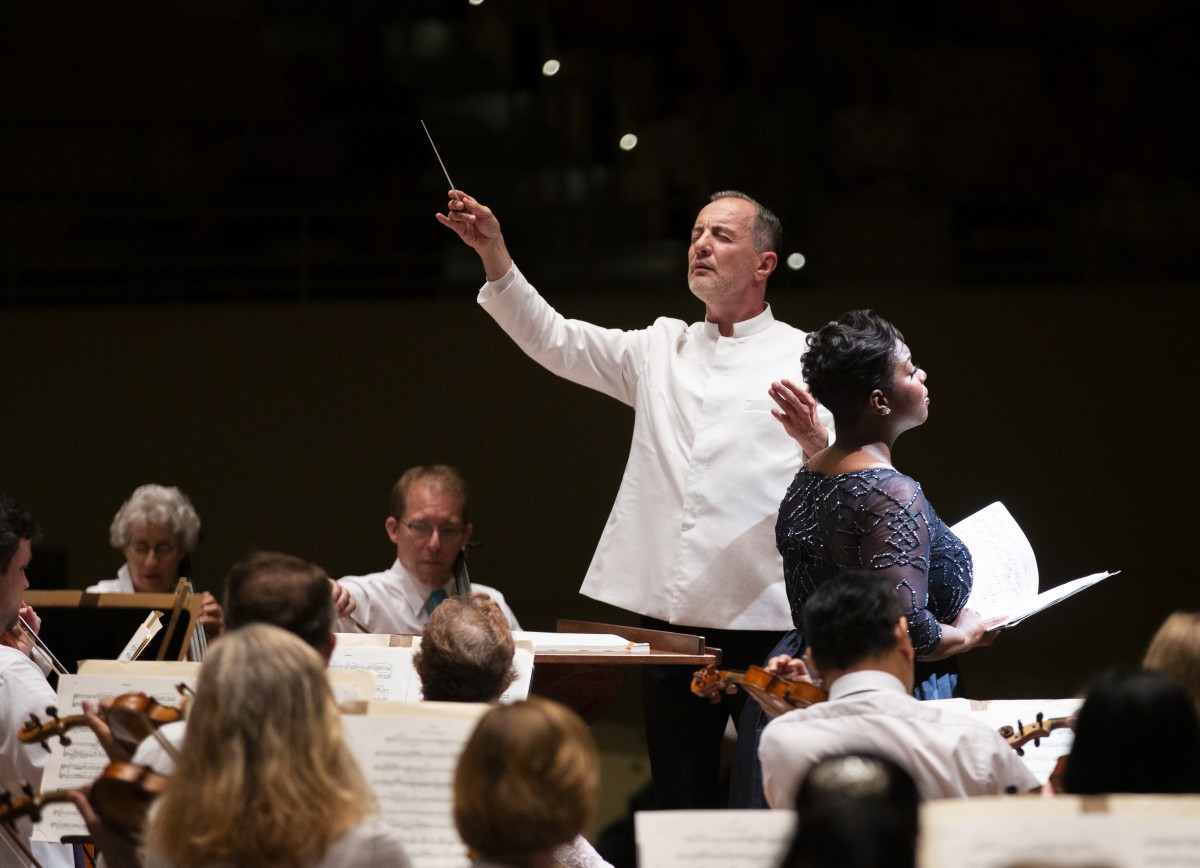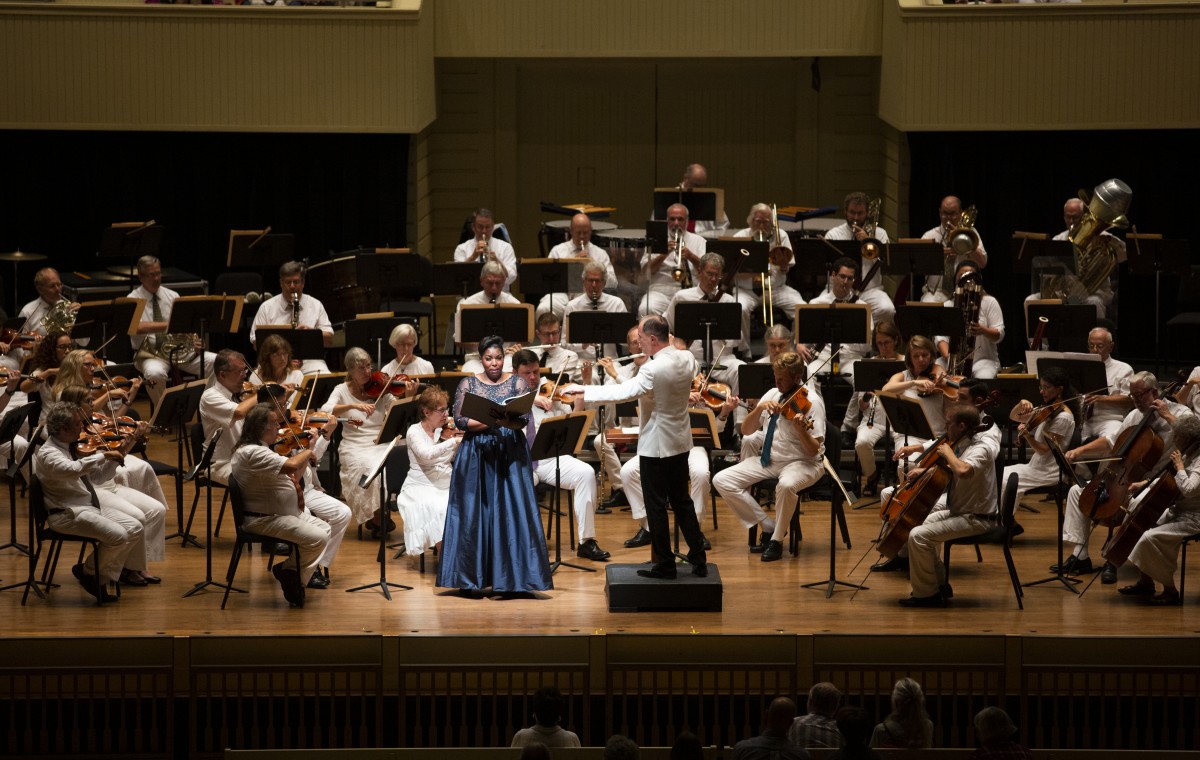Review by Anthony Bannon:
The footing is difficult; the way to death is not easy, or clear. Art in its first, unique moments is difficult — as if finding one’s way into a new night.
A small end-of-season and under-threat-of-rain audience heard Chautauqua Symphony Orchestra first-class music filling the empty seats and the humid air of the Amphitheater’s huge space and beyond.
The concert awakened dogs.
Soprano Michelle Johnson suggested, when she last performed here, that the CSO interpret Richard Strauss’ “Four Last Songs,” among the most extraordinary in the repertory of concert music, in good measure because of what it asks of the fragile relationship between orchestra and soloist, each to their roles, each in ensemble, each truly caring for the art of the other. It was a masterful, unforgettable experience.
Yes, it was, as billed, “Sensational Strauss,” though the two works at play summoned cerebral ideas of the first and the last: The beginnings of ideas and their last breath. The composer’s “Four Last Songs” were indeed Strauss’ last compositions, with lyrics for three by the poet with whom he shared so much of life’s direction, Hermann Hesse (1877-1962). The fourth song is by the deep Romantic Joseph Freiherr von Eichendorff (1788-1857), who spares no fine words within his “At Sunset”:
“The great peace here is wide and still / and rich with glowing sunsets: / If this is death, having had our fill / of getting lost, we find beauty — No regrets.”
This review is not about the waltz king from Vienna.
The German composer Richard Strauss (1864-1949) sought profound guides to aid his passage, sought poets, wise men, even a prophet. Zoroaster, the Persian thinker from 1500 to 1000 B.C.E., was a selected prophet, discovered in the novel of a fellow traveler, Fredrich Nietzsche (1844-1900), the German philosopher whose recognition of the complexity, the contradictions and the shifting understandings in life had great influence. The two men — Strauss and Nietzsche — realized Zoroaster’s call for a self-aware search for truth, not rule-bound, but free.
A history of ideas cites Zoroastrianism as among the prototypical philosophies. One finds it in the Greeks, where an actively examined life is engaged by thought, word and deed as keys to an often contrary search for truth. This much also was central for such as Voltaire, William Butler Yeats and Jean-Philippe Rameau.
Strauss had been moved by one of Nietzsche’s novels, written between 1883 and 1885. And Strauss responded by using the same title for his influential work, fully entitled “Thus Spoke Zarathustra,” Tone Poem (Freely After Fredrich Nietzsche) for Large Orchestra, in 1896. It holds a good bit of complex wisdom but does not presume to illustrate the philosopher’s poetic voice. Strauss had plenty within his own voice. Sometimes too much.
Strauss had entered the stride of his creative life. He had heard Johannes Brahms and was moved by the emotional depth of a powerful romanticism. He abided by the work of Richard Wagner, particularly in its interpretive referencing to nature. Aware of the dissolution of his time, Strauss responded in voice with Hesse and Nietzsche, expecting the hero, an Overlord, to overcome uncertainty.
For “Zarathustra,” Strauss created huge entrance, the sunrise theme that now is iconic. It has become a sign of a transformative higher power, that dawning moment memorialized in “2001: A Space Odyssey,” as well as in its conclusion, when “Star-Child” was born.
The Massey Memorial Organ, a symphonic instrument within the Amphitheater, holds more than 5,600 pipes. Its estimable presence, a resonant voice that is felt as much as heard, created a base to venture toward such a heroic understanding.
The performance was Saturday evening, in the last hour of Sabbath. The orchestra performed with ringing clarity, crisp enunciation from the crucial trumpet call that is so well-known, and a knockout summation.
Plucked strings harshly, and a call of crows from beyond the Amphitheater, the audience freshened for the following ascendant grace, a passage called “The Great Longing,” proclaiming the good, as well as anticipating a countering discord. Such is the repeated challenge for the 33-minute-long tone poem. Heard with focus upon Strauss’ era, uncertain about its direction — with its new technology and its industry yet finding balance — “Zarathustra” asserts a will to persevere and struggle, manifest in the warrior spirit of a leader Nietzsche named “Overman.”
And outside the Amp, the sounds of a flight of geese. A great longing in the strings, and the yap of a small dog.
The orchestra’s work is to order the jagged narrative of the work. A sample of eight topics shows “The Great Longing,” followed by “Joys and Passions,” whereupon “The Song of the Grave” giving way to thoughts “Of Science and Learning.” Then at the last, “The Dance Song” and “Song of the Night Wanderer.” A swirling complexity of learning, shrill, painful experience, a repose, the sounds of birds and a darkness of doubt. An awful lot is managed, and under the baton of CSO Conductor and Music Director Rossen Milanov, a standup, learned performance.
“Zarathustra” requires both elation and pain. Music has its right to require a world from its listeners, including promise of confusion and quiet; chaos with calm. Solutions may be hidden, riddles especially about sequence and development. And the puzzle may be repeated another way. At least opened, the poem then comes to an end. Extraordinary.
Michelle Johnson, the returning soprano, had opened the evening with death’s development. Strauss was notoriously opportunistic and loathsome. But his selection of Hesse’s poems “Spring” and “September” point toward a finally tranquil understanding of time’s passage. From “Spring”:
“I feel the healing touch / Of softer days, warm and tender/ My limbs tremble — happily, too much — / As I stand inside your splendor.”
And from “September”:
“With a final glance at the roses – / too weak to care, it longs for peace – / then, with darkness wherever it gazes, / summer slips into sleep.”
Then, in “When I Go to Sleep”:
“Now that day has exhausted me / I give myself over, a tired child …”
The majesty of the CSO with Ms. Johnson cites the miracle of spring with the miracle of the soprano’s voice. It finds openings to emerge from the orchestra, to counterpoint an instrument or to play as one with a section. The listener finds her within the violins, within the woodwinds, and then rise above and locate a beat or a breath as a time to emerge, and the orchestra swells.
Nietzsche spoke of his understanding of Zarathustra’s teaching as if it was “All,” or it was “Nothing.”
An orchestra, a team, is all, with each its recognized part. Or it is nothing. With the CSO’s fine work, this death cannot be proud, for there remains life, surely a life of art, within it. Ms. Johnson’s voice never forces its play, it sounds through its appearance a moment with all of its possibilities, always in company with the orchestra, never without.
Ms. Johnson stood center stage with head slightly lifted, slowly regarding the curve of the space. She came to her part, entered, and gave it presence until completed, just 24 minutes.
There is an aesthetic to duration. Few, artists included, know how it works. But these songs were perfect. How much time is necessary to suggest there is life in death? The artists and their director had the answer.
Dr. Anthony Bannon received his undergraduate degree from St. Bonaventure University, and his advanced degrees in media studies and cultural studies from the English Department at the University at Buffalo. He is director emeritus at George Eastman Museum and the Burchfield Penney Art Center at SUNY Buffalo State. His new book, Portraits: William Coupon, features collected photographs from the artist’s long career with TIME magazine, and thereafter with tribal and countercultures around the world. It will launch at 7 p.m. Sept. 26 in the Burchfield-Penney.







